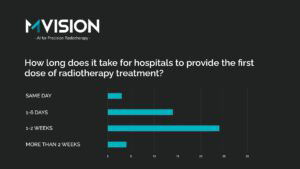Cancer waiting times have been increasing over the last year. The amount of time spent waiting for treatment has detrimental repercussions on the mental and physical wellbeing of patients. COVID 19 has negatively influenced cancer care at an international level, and may cause patients to wait even longer for the treatment they deserve.
The Poll
To better understand the current state of cancer waiting times for patients receiving radiotherapy, MVision AI recently conducted a poll. The poll was sent via social media platforms, asking the question: How long does it take your hospital to provide the first dose of radiotherapy treatment from CT SIM to the delivery of the 1st fraction? Respondents were given the opportunity to select one of the following options: on the same day, 1-6 days, 1-2 weeks, or more than 2 weeks. There were so many great responses. The MVision AI team would like to thank all of the amazing participants, including medical experts, across multiple continents who responded to this poll.
The overwhelming majority, 86% of respondents, stated that it took between 1-14 days to provide the first dose of radiotherapy. It is great that hospitals are still able to provide treatment so quickly during COVID 19, however, there are solutions that allow patients to receive treatment more quickly.

Increased cancer waiting times drastically affect the wellbeing of patients.
A 2017 study focused on cancer treatment and the mental health of newly diagnosed esophageal or gastric cancer patients. The study found that, among the patients with preexisting mental disorders, longer waiting time was associated with more frequent psychiatric hospital care during the first year after treatment.
COVID 19 has not only negatively impacted patients in the UK (with upward waiting times of over two months), but also globally.
Bhawna Sirohi, Consultant Medical Oncologist at the Apollo Proton Cancer Centre in Chennai, India, stated that, “Hospital resources have been either completely diverted to coronavirus treatment with cancer OPDs and day-care chemotherapy beds closed down or the actual capacity reduced to prioritize coronavirus patients. A culture of fear has decreased out-patient attendance of new cancer cases by 70% to 80%. A cancer crisis is looming ahead.”
“Our collective regional prioritization of COVID-19 and implementation of physical distancing as an intervention strategy has impaired cancer health providers’ functioning specifically by postponing cancer screening, in-person consultations, and control tests, as well as limiting treatments that might result in significant risk of infectious complications or require critical care,” said Eduardo L Cazap MD, PhD, FASCO, and President of the Latin-American and Caribbean Society of Medical Oncology (SLACOM).
MVision is at your service.
Considering the already increased cancer waiting times due to COVID, the consequences of waiting times on the mental health of patients, and the aftermath of COVID 19 for hospitals globally; something needs to be done to decrease waiting times to further help patients and oncology departments alike. Fortunately, MVision AI has a solution to improve radiotherapy treatment time for the betterment of oncology departments and patients alike. Rather than having to wait between 1-14 days for the first dose of radiotherapy treatment, MVision’s deep-learning, guideline based segmentation services allow you to provide treatment on the same day of the initial CT. Our deep learning model produces consistent contouring in minutes while maintaining the highest standards of quality, and staying GDPR compliant.
To stay up-to-date on the latest news and information, visit our website or follow us on LinkedIn.
For more information on our services, contact MVision AI:
c/o Terkko Health Hub, Haartmaninkatu 4, 00290 Helsinki, Finland.
Tel: +358 (0) 40 5489 229
Email: info@mvision.ai
For media inquiries
Tel: +358 40 500 7915
Email: pr@mvision.ai
Sources


